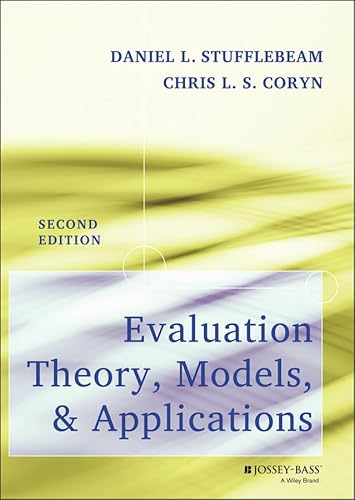Evaluation Theory, Models, and Applications (Research Methods for the Social Sciences)
Daniel L. Stufflebeam; Chris L. S. Coryn
BOOK REVIEW

In the realm of social sciences, few texts manage to resonate with the kind of depth and clarity as Evaluation Theory, Models, and Applications by Daniel L. Stufflebeam and Chris L. S. Coryn. This monumental work is not merely a manual, but a veritable blueprint for understanding the intricate web of evaluation processes that shape educational and professional practices today. At a hefty 800 pages, it is an intellectual juggernaut that invites us to explore the profound implications of evaluation on individual learning, institutional performance, and societal progress.
The authors bring to the fore a profound inquiry: How do we discern the effectiveness of programs, policies, or practices in a world awash with data? It's a question that gnaws at educators, policymakers, and practitioners alike. The text skillfully navigates through various evaluation models, firmly rooting its discussion in a historical context that reflects the evolution of the evaluation field - an evolution that has been crucial in shaping modern methodologies and practices.
Stufflebeam and Coryn's work is a clarion call to anyone committed to the rigorous pursuit of knowledge. They dismantle the mystique surrounding evaluation, deconstructing it into manageable components. Think of it as a masterclass in critical thinking - one that enhances not just your understanding of evaluation but hones your analytical skills, a treasure trove of strategies and frameworks to aid your own professional practice.
Critically, readers have lauded the authors for their accessible prose and comprehensive treatment of evaluation theory, yet some have voiced concerns about the overwhelming amount of content. How can one possibly distill this vast reservoir into practical application? Yet therein lies the beauty - much like a symphony, the power of this text emerges not just from its individual notes but the harmony they create when combined.
This book resonates particularly in light of the contemporary dilemmas faced in educational settings, as schools and universities grapple with an influx of accountability measures. In this age of information overload, the ability to critically evaluate data and its implications has never been more crucial. One cannot help but draw parallels to the political climates and societal shifts that demand greater scrutiny of public policies and services.
Moreover, the authors don't shy away from addressing challenges, inviting readers into a dialogue about the ethical implications of evaluation. Are we merely numbers on a spreadsheet, or do our lived experiences hold weight when gauging success? Hidden within the methodologies are profound questions about equity, representation, and the very nature of "success."
Feedback from the academic community shows a wide spectrum of reactions; while many applaud its thoroughness, some critique its density. Yet, in the ballet of scholarly discourse, such critiques merely ignite further conversation about what effective evaluation truly entails.
In the end, Evaluation Theory, Models, and Applications doesn't just inform; it transforms. Imagine walking through a dense forest, equipped with nothing but a compass and this book's wisdom guiding you through the thicket of evaluation challenges. You emerge not only with the ability to evaluate programs but a sharpened insight into the human condition itself-how we measure, understand, and improve.
Dive into this text, and you might not just learn about evaluation; you might just reshape your perspective on what it means to evaluate something as complex as the world around us. 🌍✨️
📖 Evaluation Theory, Models, and Applications (Research Methods for the Social Sciences)
✍ by Daniel L. Stufflebeam; Chris L. S. Coryn
🧾 800 pages
2014
#evaluation #theory #models #applications #research #methods #social #sciences #daniel #stufflebeam #DanielLStufflebeam #chris #coryn #ChrisLSCoryn